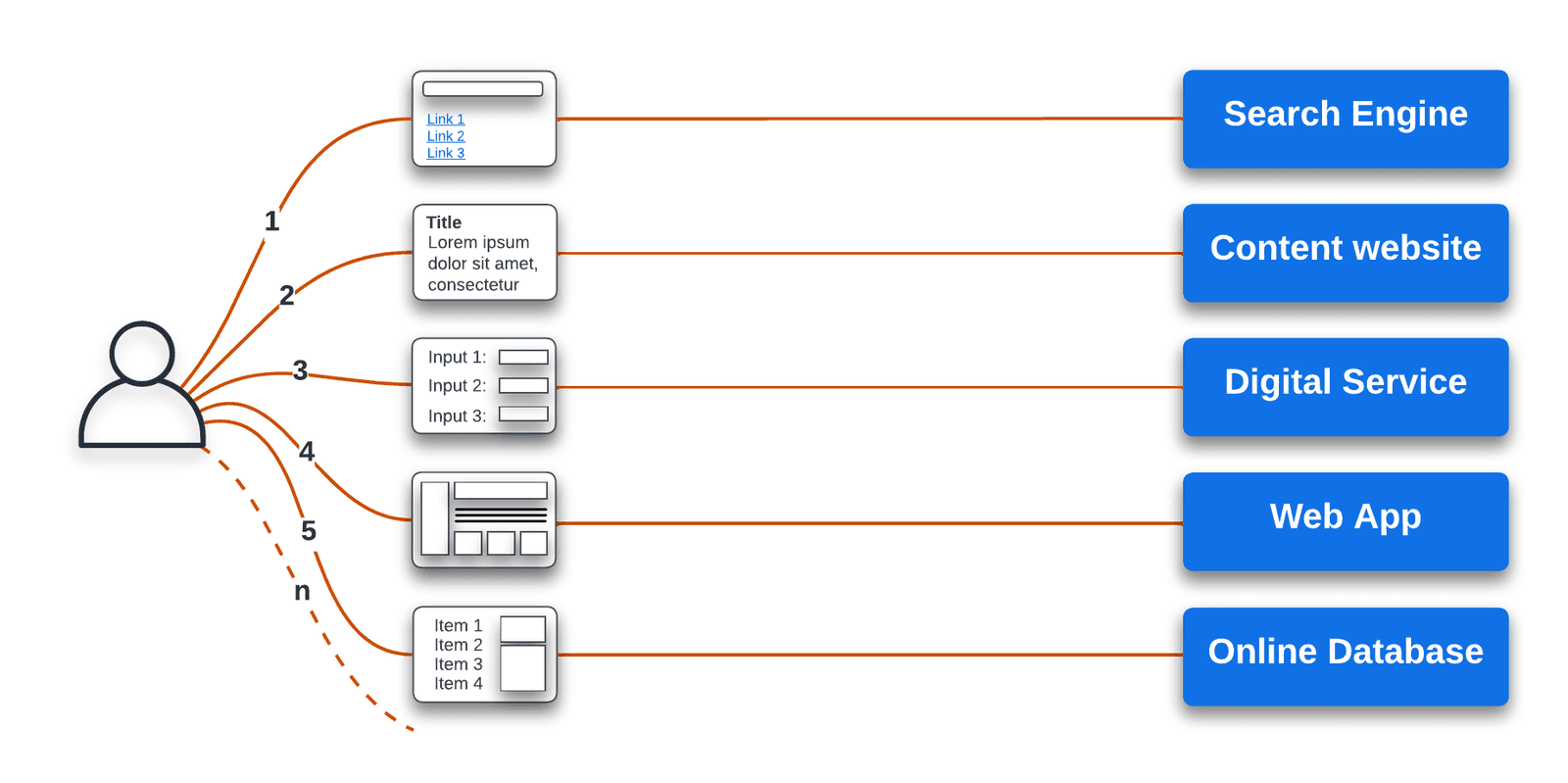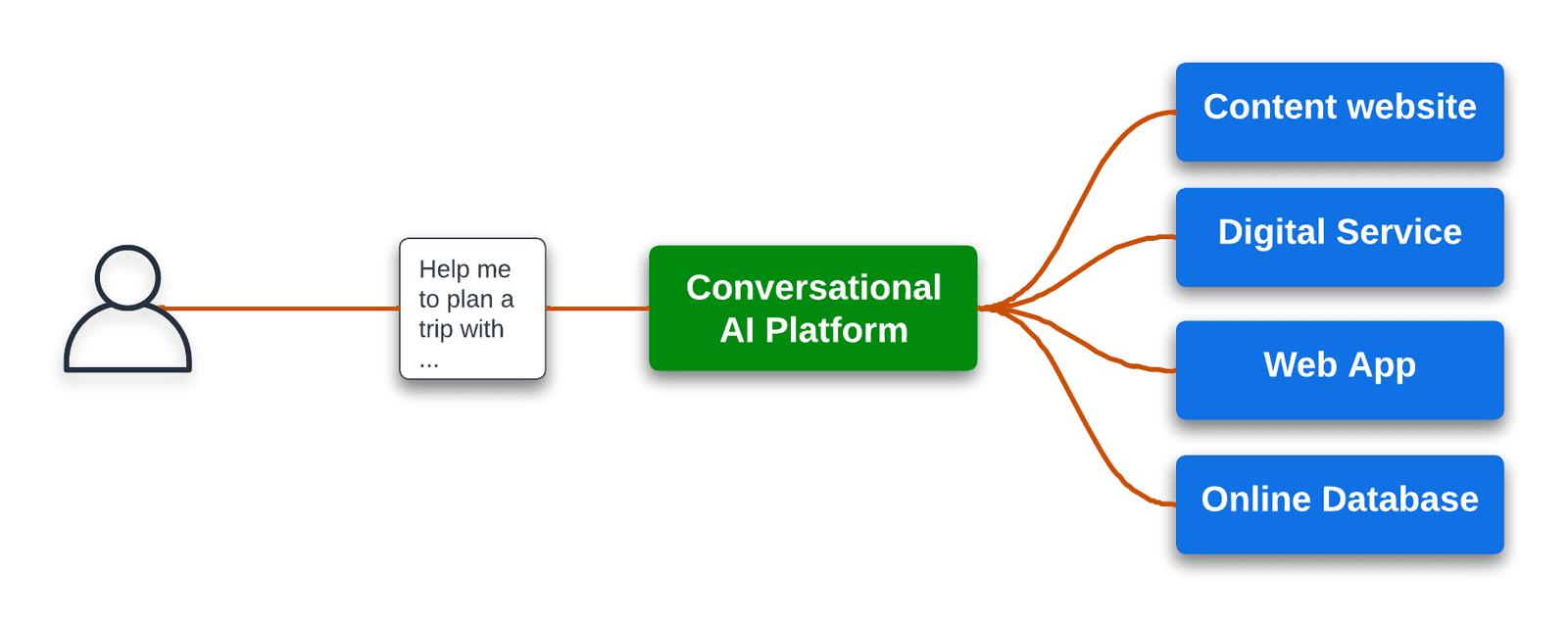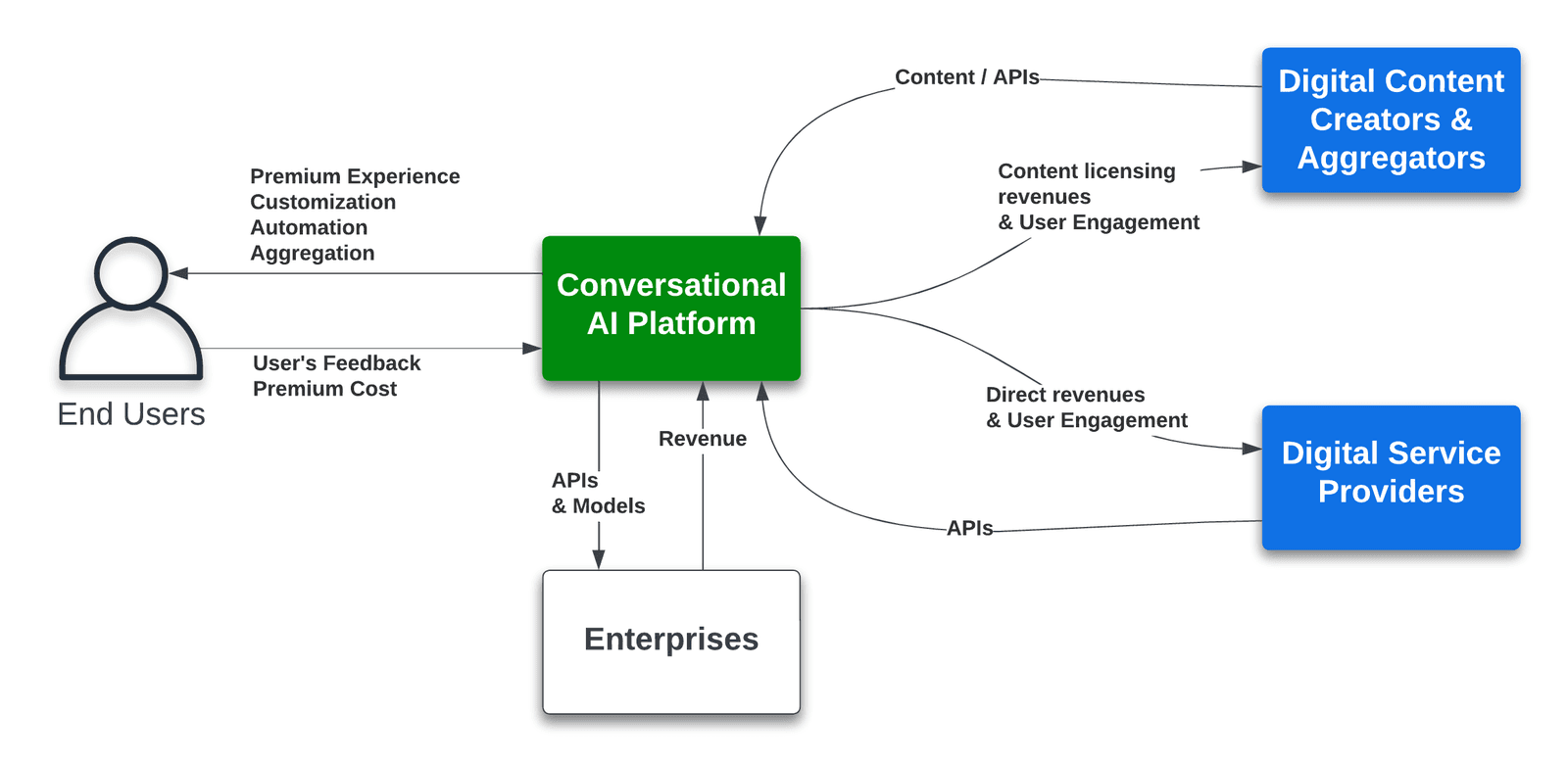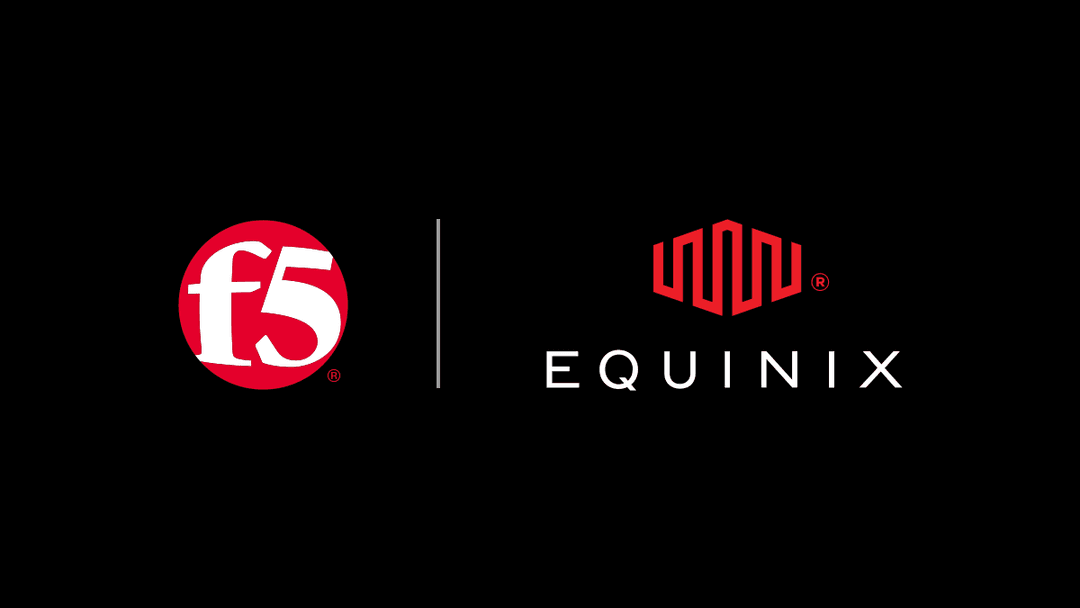Modern applications are notoriously siloed. If you don’t have an app that matches your task, but rather need to compose a solution from several apps, sharing data among them, you’ll find it rough going. People have been trying to address this problem for a long time. The Apple Newton, the great grandparent of today’s mobile devices, was designed to avoid silos, using shared object stores and clever UI and language design. Mashups on the Web are another idea aimed specifically at app integration. Alas, no one has ever succeeded in creating a widespread ecosystem around un-siloed applications. Now, however, a new force has emerged to shatter silos once and for all: artificial intelligence.
The way we use the internet is about to change in a big way. Platforms like ChatGPT, Gemini, and Bing Copilot are leading the charge, harnessing the power of conversational AI to transform the way we interact with the Web. Instead of jumping from website to website, we’ll soon be able to simply “chat with the internet” to get what we need. This new user experience will be akin to a limitless mashup of content and services, created on the fly to answer any question or fulfill any need you might have.
This shift towards a more unified and efficient Web navigation method is a big leap from the traditional siloed Web browsing we’ve gotten used to. It promises not just improvements in how we experience the Web but also brings about radical changes in business models and how we interact with online services and machines.
The Web Today: A Fragmented Journey
Let’s be honest, the internet as it stands now can be frustrating for some activities. You start with a search engine, then click from one site to the next, hoping to find what you need. It’s especially tiring because every website looks and works differently.

Need to plan a family vacation? Good luck! It’s an intricate process which involves sifting through countless sites to find the best deals for flights, accommodations, and activities. What if there was a better way? What if planning your dream vacation was as easy as having a conversation with a super-smart, all-knowing travel buddy?
Revolutionizing the Web Experience: Breaking Down Silos
The premise of such a smart travel assistant already exists as specialized extensions or "GPTs" for platforms like Gemini or ChatGPT. They are still clunky and not fully operational yet, but they are likely the direction of the future. Once again, it's about breaking down the silos between websites and offering a user experience that is vastly superior.
At the heart of this change are Conversational AI Platforms. They are poised to revolutionize this paradigm by dismantling the existing silos within the Web. They understand what you need and can seamlessly connect you with the best resources, content, and services from across the Web. Let’s break this down:
- Users First: You interact with this AI platform for a personalized, streamlined experience on the Web. Think of it as the ultimate upgrade from endless searches!
- The Web Hub: Conversational AI Platforms become the meeting place for all things online. It connects you to content creators, websites, and service providers, pulling the best stuff together for you.
- Rethinking Business: With this model, companies that currently rely on things like ads and walled-off websites may need to consider new ways to reach users and generate revenue.

The ambition of these next-generation platforms extends beyond merely enhancing user experience. They represent a fundamental shift in how we interact with the digital world, promising a future where the Web is more integrated, responsive, and attuned to our needs. As we stand on the brink of this exciting transition, it's clear that the end of Web silos signifies a leap forward in making the Web more accessible, intuitive, and seamlessly integrated into our daily lives.
A New Digital Platform Model: Conversational AIs Take Center Stage
In this new world order, the dialogue powered by Large Language Models (LLM) is the core unit of value. These platforms are like the ultimate party hosts, facilitating dynamic interactions between users, content creators, and existing digital services. The success of these interactions all comes down to the platform's ability to understand the user's history and seamlessly integrate content and services. The platforms that nail this are going to be the stars of this digital multi-sided ecosystem.

End users will be interacting with the Conversational AI Platform to get a premium experience that’s tailored just for them, with automation and personalization set at an unprecedented scale. Their feedback and paid access will be their contribution to these platforms.
In return, the Conversational AI Platform is like the ultimate connector, the central hub. It's directing user engagement towards digital content creators and aggregators as well as digital service providers, leveraging content and APIs to foster a cohesive relationship. These creators and services will be remunerated by these platforms through content licensing, subscriptions, and transactions integrated into conversations but transparently redirected to the services, generating additional revenue and further user engagement. In addition, enterprise-oriented offerings (APIs and models) will add another revenue cycle to sustain this ecosystem.
This new digital platform model is like a wrecking ball, smashing traditional silos and creating a Web experience that's more connected and responsive than ever. The Web is no longer a mishmash of disjointed interfaces and experiences—it's a unified, adaptive environment that's constantly learning and evolving with every user interaction.
An Overview of the Upcoming Transformations
The implications of this new digital platform model are massive and multifaceted. First up, search engines as we know them are in for a major overhaul. They'll be morphing into a hybrid of inference engines and traditional information retrieval systems. This means that classic search engine operations will take a backseat, while more predictive and personalized content curation based on user behavior and preferences will be taking the wheel.
But that's not all—several Web business models, especially those that rely on advertising and walled-garden subscriptions, will need a complete rethink. As the digital ecosystem becomes more interconnected, the revenue strategies that underpin these models will have to evolve to keep up with changing consumer behaviors and expectations.
And what about those dedicated Web User Interfaces (UIs) that we've all grown so accustomed to? Well, they might not be as important as they once were. Instead, APIs are set to take center stage, serving as the glue that holds everything together and enables seamless integration and interaction across platforms and services. This shift puts the spotlight on interoperable systems and open standards in the evolving Web infrastructure.
But wait, there's more! Operating systems—both desktop and mobile—are also going to play a vital role in this transformation. They'll be evolving to allow for a seamless mixing of local and remote content and services within conversations. This will blur the lines between devices and the cloud even further, creating a more cohesive experience for the user, where access to information and functionality is smooth and intuitive.
All of this applies not just to Web browsing but to app stores as well. The parties that seem best positioned to affect this revolution are either the big AI providers, the OS vendors, or the major Web browsers. They enjoy ubiquity and user trust. And yet, one can’t count out innovative startups that are more nimble and have already started delivering on this vision.
And let's not forget about the rise of multimodal chat interfaces, which are poised to support a much richer set of interactions. These interfaces will likely enable users to interact directly with content creators and service providers within the conversational flow. By doing so, the barriers between content, services, and the user are minimized, fostering a more direct and engaging digital experience.
So, as the Web transitions to this new model, it's not just about making things better for users—it's about completely reimagining the fundamental ways in which digital content and services are structured, delivered, and monetized. The evolving role of operating systems is a perfect example of the overall shift towards a more integrated and user-centric digital landscape. As we set out on this journey, the convergence of local and cloud-based resources through conversational interfaces promises to redefine our interactions with the digital world, signaling a leap forward in the Web's evolution.
Overcoming Obstacles: A Collaborative Effort
Of course, change this big won’t happen overnight! The road to Conversational AI Platforms is paved with significant challenges that we'll need to navigate with precision and strategic foresight. At the heart of this transformation is the need for advancements in model accuracy and the effective orchestration of interactions. We'll need to carefully identify and address technological, societal, and business friction points to pave the way for this new era. It's clear that the resolution of these challenges goes beyond what Conversational AI Platforms can handle alone. We'll need a collaborative effort involving Conversational AI Platforms, content creators, service providers, regulators, network providers, security experts, and infrastructure specialists. The symbiotic relationships forged between AI platforms and these entities will lay the foundation for a robust and adaptable digital ecosystem.
Envisioning the Future: The Next Evolution of the Web
We anticipate the evolution of this space to be rapid, with substantial progress expected within the next five years. The benefits for users will be so significant that Web users themselves will be the driving force behind this transformation. Conversational AI Platforms that manage to create a virtuous and financially attractive ecosystem for users, content creators, and digital services will be the platforms of tomorrow. Yes, there are hurdles, but the potential is too big to ignore. We’re on the brink of a Web revolution.
About the Author
Related Blog Posts

Multicloud chaos ends at the Equinix Edge with F5 Distributed Cloud CE
Simplify multicloud security with Equinix and F5 Distributed Cloud CE. Centralize your perimeter, reduce costs, and enhance performance with edge-driven WAAP.
At the Intersection of Operational Data and Generative AI
Help your organization understand the impact of generative AI (GenAI) on its operational data practices, and learn how to better align GenAI technology adoption timelines with existing budgets, practices, and cultures.
Using AI for IT Automation Security
Learn how artificial intelligence and machine learning aid in mitigating cybersecurity threats to your IT automation processes.
Most Exciting Tech Trend in 2022: IT/OT Convergence
The line between operation and digital systems continues to blur as homes and businesses increase their reliance on connected devices, accelerating the convergence of IT and OT. While this trend of integration brings excitement, it also presents its own challenges and concerns to be considered.
Adaptive Applications are Data-Driven
There's a big difference between knowing something's wrong and knowing what to do about it. Only after monitoring the right elements can we discern the health of a user experience, deriving from the analysis of those measurements the relationships and patterns that can be inferred. Ultimately, the automation that will give rise to truly adaptive applications is based on measurements and our understanding of them.
Inserting App Services into Shifting App Architectures
Application architectures have evolved several times since the early days of computing, and it is no longer optimal to rely solely on a single, known data path to insert application services. Furthermore, because many of the emerging data paths are not as suitable for a proxy-based platform, we must look to the other potential points of insertion possible to scale and secure modern applications.